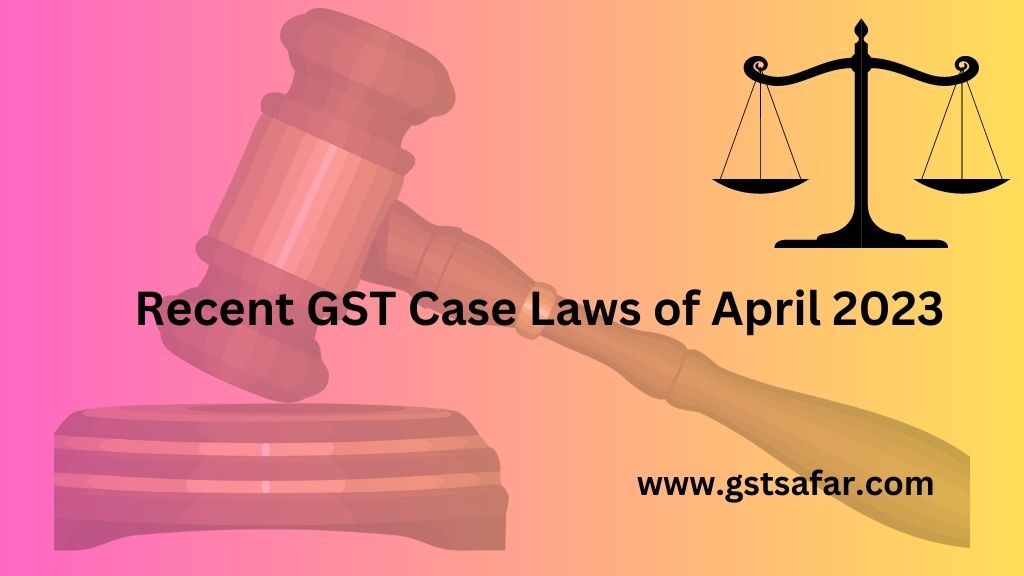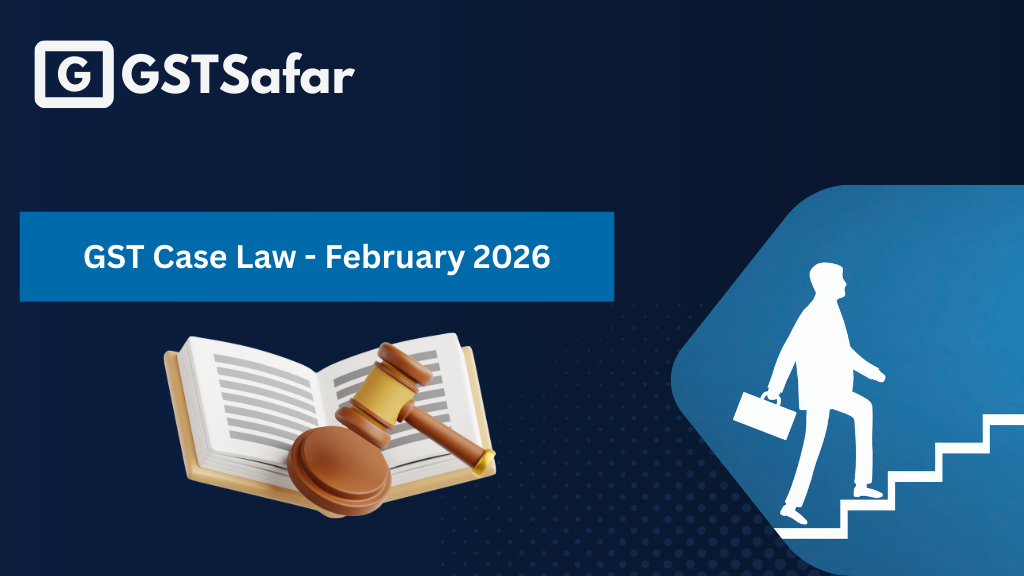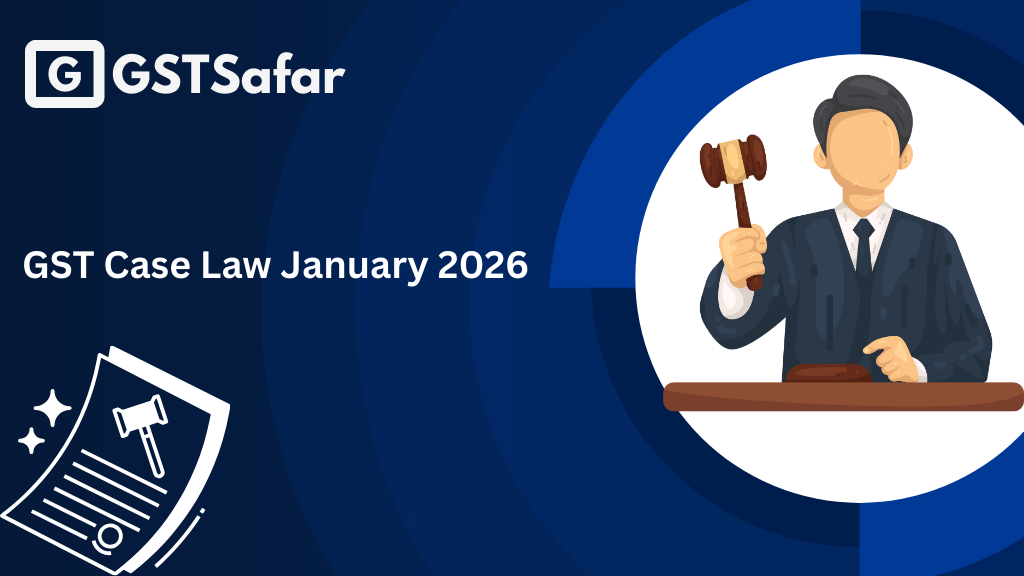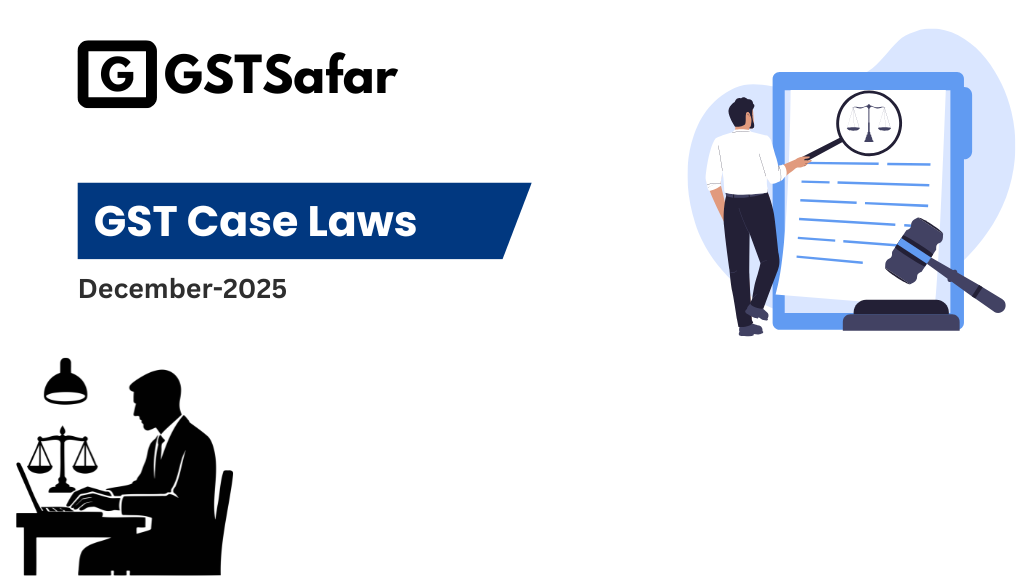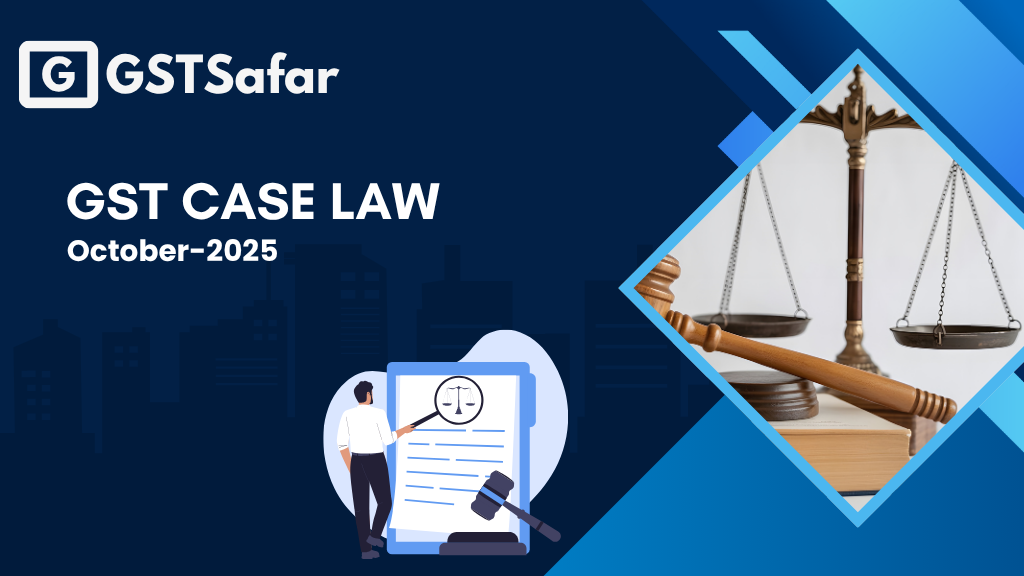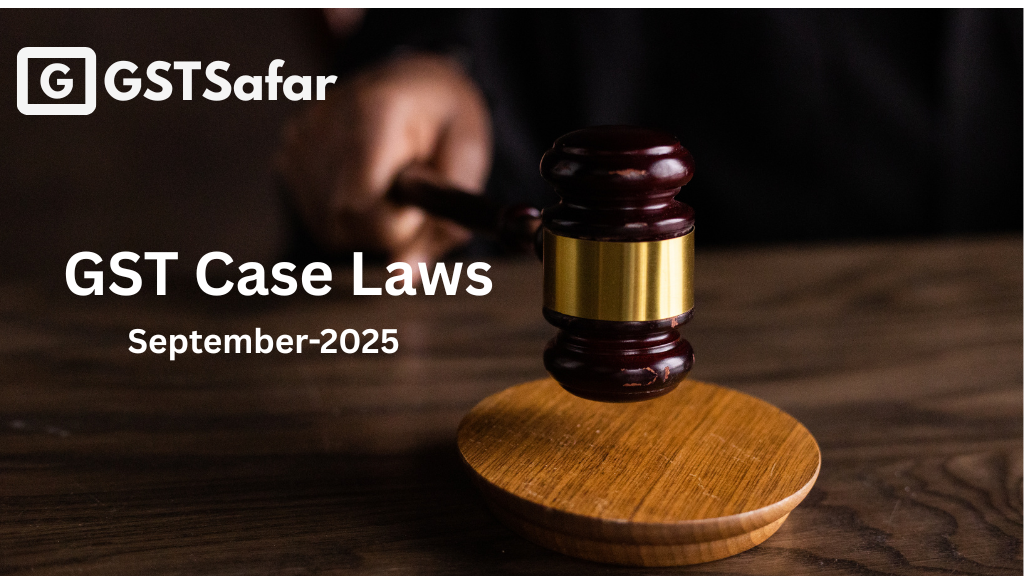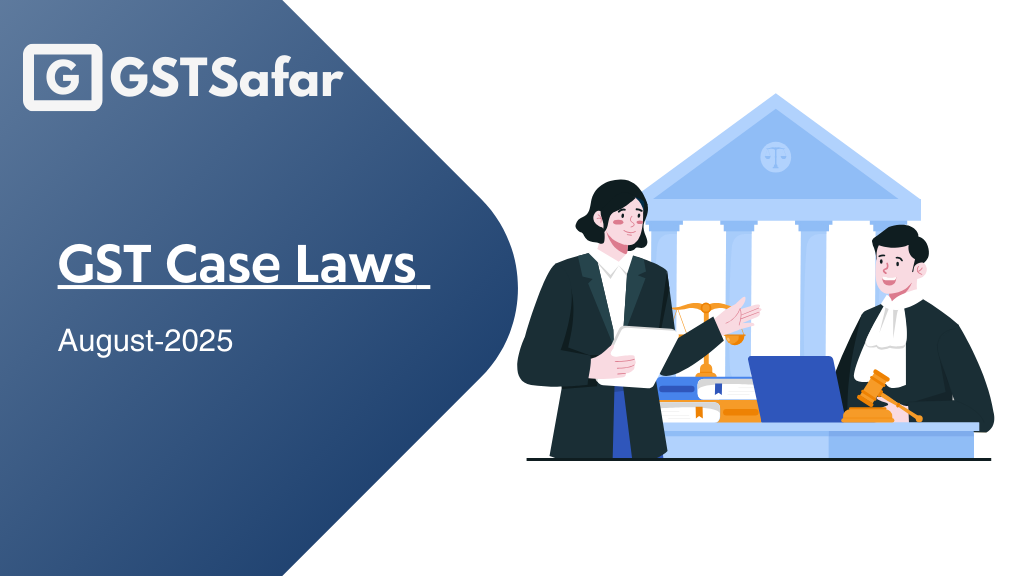The goal of this article is to cover all recent GST case laws 2023. All latest high court judgement on gst and all latest supreme court judgments on gst issued in April 2023 have been covered in this article. All latest GST case laws of April 2023 in this article have been classified by name, date, judge, counsel, GST concept, GST section, etc. In addition, a PDF of the GST case law is provided with the case law so that the user can download it for further study.
Table of Contents
ToggleGST Case law on Avaibility of ITC on revocation of cancelled GST registration
Rajasthan High Court held that ITC claim can be lodged for the period from cancellation of GST registration till the date registration is restored.
| High Court : Rajasthan High Court Judgement 2023 |
| Name of case : M/s R.K. Jewelers VS Union of India |
| Date of Judgment : 26-04-2023 |
| Appeal No : D.B. Civil Writ Petition No. 4236/2023 |
| Judges : MR. JUSTICE VIJAY BISHNOI, MR. JUSTICE PRAVEER BHATNAGAR |
| Counsel Name : Mr. Prahlad Singh |
| Fact of the Case: The GST registration of the petitioner-firm has been cancelled on the ground of non-filing of GST return by it. The appeal filed by the petitioner-firm against the said order has also been rejected by the Appellate Authority |
| Held by court : Court held that when the competent authority considers the issue of revocation of cancellation of petitioner firm GST registration under the notification dated 31.03.2023, the petitioner-firm, shall be entitled to lodge its claim for availment of Input Tax Credit in respect of the period from the cancellation of the registration till the registration is restored. |
| In favor of : Assessee |
| Topic of GST : Avaibility of ITC on revocation of cancelled GST Registration |
| Section of GST: Section 29 & 30 of CGST Act,2017 |
GST case law on Anti profiteering authority | Recent GST Case laws 2023
Calcutta High court has refused to grant a stay on the order passed by the National Anti-Profiteering Authority.
| High Court : Calcutta High Court Judgement 2023 |
| Name of case : Siddha Real Estate Development (P.) Ltd. vs. National Anti-Profiteering Authority |
| Date of Judgment : 11-04-2023 |
| Appeal No : WPA NO. 7189 OF 2023 |
| Judges : MD. NIZAMUDDIN, J. |
| Counsel Name : Ms. Sweta Mohanty |
| Fact of the Case: The petitioner claimed that they were challenging the constitutionality of Section 171 of the CGST Act and the anti-profiteering rules, and also seeking interim relief against an order issued by the National Anti-Profiteering Authority. |
| Held by court : The petitioner had delayed challenging the impugned order for six months, so there was no urgency to grant an interim order of stay. Under the law, any action taken by an authority should be considered valid unless it is declared unconstitutional. However, since the constitutional validity of the provisions had been challenged, the writ petition needed to be entertained. |
| In favor of : Assessee |
| Topic of GST : Anti profiteering authority |
| Section of GST: Section 171 of CGST Act,2017 |
calcutta high court judgement pdf
GST Case law on Application of Advance Ruling | Recent GST Case laws 2023
Calcutta High Court says Appellants were eligible to make the application for Advance ruling even though they were recipients
| High Court : Calcutta High Court Judgement 2023 |
| Name of case : Anmol Industries Ltd. vs. West Bengal Authority for Advance Ruling, Goods and Services Tax |
| Date of Judgment : 21-04-2023 |
| Appeal No : M.A.T. NO. 630 OF 2023 I.A. NO. CAN 1 OF 2023 |
| Judges : T. S. SIVAGNANAM, CJ. AND HIRANMAY BHATTACHARYYA, J. |
| Counsel Name : Ankit Kanodia, Ms. Megha Agarwal and Abhijat Das |
| Fact of the Case: The AAR had determined that the appellant, as a recipient of services, did not have the right to file an application for advance ruling. |
| Held by court : The definition of “applicant” under Section 95(c) of the Central Goods and Services Tax Act, 2017 is broad and includes any person registered or seeking registration under the Act. The appellants were registered under the Act and thus met this criterion. Section 97 of the Act lays down the procedure for applying for an advance ruling, and the question on which a ruling is sought must fall within the scope of section 97(2). In the present case, the appellants sought a ruling on the applicability of an exemption notification under the Act, which fell within the scope of section 97(2)(b). Therefore, the appellants were eligible to apply for an advance ruling, and the ruling of the Authority for Advance Rulings (AAR) was to be set aside. The matter was to be remanded. |
| In favor of : Assessee |
| Topic of GST : Advance ruling Application |
| Section of GST: Section 95 & 97 of CGST Act,2017 |
latest judgement of calcutta high court
GST Case law on Bail in case of ITC fraud| Recent GST Case laws 2023
Supreme Court says bail was to be allowed on other condition imposed by trial court
| High Court : Supreme Court Judgement 2023 |
| Name of case : Makhijani Pushpak Harish vs. State of Gujarat |
| Date of Judgment : 19-04-2023 |
| Appeal No : CRIMINAL APPEAL NO. 1193 OF 2023 SPECIAL LEAVE PETITION (CRL.) NO. 2868 OF 2023 |
| Judges : KRISHNA MURARI AND ASHANUDDIN AMANULLAH, JJ. |
| Counsel Name : Bharat Rai Chandani, Deepak Kumar Khokhar, Mrs. Sonia Abrol, Aneesh Mittal |
| Fact of the Case: The condition of pre-depositing the evaded amount for the grant of bail has been held to be bad and cannot be imposed, as established in various earlier cases, including recent judgments such as the Subhash Chouhan case and the Anatbhai Ashokbhai Shah case. |
| Held by court : As the facts of the present case were identical to those in the earlier cases, the reasons given in those judgments were followed, and the pre-condition of furnishing a bank guarantee imposed by the High Court was held to be bad and was set aside. Bail was to be allowed on other conditions imposed by the Trial Court. |
| In favor of : Assessee |
| Topic of GST : Bail in case of ITC Fraud |
| Section of GST: Section 132 of CGST Act,2017 |
GST Case law on intermediary services specified in section 13(8) of IGST Act.2017|Recent GST Case laws 2023
Bombay High Court has ruled that Section 13(8)(b) and Section 8(2) of the IGST Act are legal, valid, and constitutional.
| High Court : Bombay High Court Judgement 2023 |
| Name of case : Dharmendra M. Jani vs. Union of India |
| Date of Judgment : 18-04-2023 |
| Appeal No : WRIT PETITION NO. 2031 OF 2018 |
| Judges : G.S. KULKARNI, J. |
| Counsel Name : Bharat Raichandani, Rishabh Jain, Abhishek Rastogi, Pratyushprawa Saha, Mahir Chablani, Ms. Kanika Sharma and Marmik Kamdar |
| Fact of the Case: The petitioner has contended that the nature of the transaction(s) entered by the petitioner with its overseas customers are transactions of “export of services”, as the petitioner was providing services to its overseas clients, which were consumed and used by the overseas clients outside India, for which valuable foreign exchange was earned by the country, hence, such transactions were outside the purview of the CGST and the MGST Acts. The petitioner, therefore, addressed a representation dated August 22, 2017, to the Superintendent, CGST, Mumbai Range-I inter alia recording that with the advent of the Goods and Services Tax, in terms of Section 13(8) of the IGST Act, the place of supply of “intermediary services” has been defined as the place of the supplier of the service. It was stated that by virtue of such provision, the services provided by the petitioner to the overseas clients are being subjected to the Goods and Services Tax in India. The petitioner stated that it has been the policy of the Central Government to promote exports, hence, the inclusion of intermediary services under Section 13(8) of the IGST Act would lead to the closure of business of several such agencies resulting in loss of jobs for several employees. The petitioner recorded that the petitioner intended to challenge the said provision, and hence, the petitioner would pay GST on the said commission under protest, as the petitioner did not accept the liability to pay GST on the said transactions. The petitioner, hence, reserved its right to claim refund of the duties so paid. It is on such premise, the petitioner has assailed the provisions of Section 13(8)(b) and Section 8(2) of IGST Act as noted above |
| Held by court : High court held that section 13 (8) (b) and section 8(2) of IGST Act can only applied to IGST Act and can not be used to levy CGST and State GST/Maharastra GST Act. |
| In favor of : Assessee |
| Topic of GST : Applicability of sections of IGST Act |
| Section of GST: 13(8) of IGST Act & Section 8(2) of IGST Act,2017 |
bombay high court judgement pdf
GST Case law on Show cause notice | Recent GST Case laws 2023
Jharkhand High Court says without issuing show cause notice , proceeding will not be initiated.
| High Court : Jharkhand High Court Judgement 2023 |
| Name of case : Vishkarma Industries vs. State of Jharkhand |
| Date of Judgment : 18-04-2023 |
| Appeal No : W.P.(T) NO. 2091 OF 2019 |
| Judges : APARESH KUMAR SINGH AND DEEPAK ROSHAN, JJ. |
| Counsel Name : Sumeet Gadodia, Ranjeet Kushwaha and Aakansha Mittal, |
| Fact of the Case: The assessees were accused of wrongful availment of Input Tax Credit (ITC) and passing on the benefits of ITC to others, but the proper procedure for issuing a show cause notice under section 74(1) was not followed and only a summary of the show cause notice was issued. |
| Held by court : A summary of a show cause notice cannot be considered as a proper show cause notice, and any attempt to substitute the same would violate the principles of natural justice. In the absence of clear charges, the opportunity to defend oneself is denied. Additionally, the authorities did not provide an opportunity for a hearing as required by Section 75(4) and Section 75(5) before passing the adverse order. Furthermore, the documents forming the basis of the impugned order were not provided to the assessee. Therefore, the impugned show cause summary and adjudication orders are to be invalidated. The competent authority or proper officer is permitted to initiate a fresh proceeding by issuing a proper show cause notice. |
| In favor of : Assessee |
| Topic of GST : Recovery & Adjudication order & Show cause notice |
| Section of GST: Section 74 and 75 of CGST Act,2017 |
GST case law on Opportunity of personal hearing | Recent GST Case laws 2023
Allahabad High Court says no personal hearing was granted to petitioner and there was prima facie no material other than SIB Report
| High Court : Allahabad High Court Judgement 2023 |
| Name of case : Lari Almira House vs. State of U.P. |
| Date of Judgment : 12-04-2023 |
| Appeal No : WRIT TAX NO. 1569 AND 1570 OF 2022 |
| Judges : PANKAJ BHATIA, J. |
| Counsel Name : Aloke Kumar |
| Fact of the Case: The petitioner argued that there was a violation of the principle of natural justice as he was not provided with a copy of the SIB report, and the ex-parte order was solely passed based on such report |
| Held by court : The department had to prove that non-payment was due to fraud, wilful misstatement or suppression of facts, and a mere inspection report and discrepancy in return scrutiny were insufficient to assess and impose tax. By not providing the SIB report, the principles of natural justice had been violated. The petitioner was not given a personal hearing, and there was no other material evidence besides the SIB report. Therefore, the challenged order was to be set aside, and the matter was to be remanded to the adjudicating authority to provide a copy of the SIB report and allow a personal hearing.The authorities’ powers to conduct a search and seizure under section 67 and to scrutinize returns under section 61 are preliminary measures for initiating proceedings under section 73 or section 74. Merely invoking section 67 or section 61 does not establish tax evasion, as such evasion must be proven in accordance with section 73 or section 74. |
| In favor of : Assessee |
| Topic of GST : Demand & Order |
| Section of GST: Section 74 & section 61 & section 67 of CGST Act,2017 |
GST Case law on Exemptions | Recent GST Case laws 2023
Delhi High court says Central government can withdraw exemptions which was earlier available
| High Court : Delhi High Court Judgement 2023 |
| Name of case : Uber India Systems (P.) Ltd. vs. Union of India |
| Date of Judgment : 12-04-2023 |
| Appeal No : W.P.(C) NO. 14048 OF 2021 AND OTHS. |
| Judges : MANMOHAN AND MS. MANMEET PRITAM SINGH ARORA, JJ. |
| Counsel Name : Bharat Raichandani and Arjyadeep Roy |
| Fact of the Case: The issue at hand is whether the notifications that withdrew exemption from GST for transportation services provided by auto rickshaws and non-AC stage carriages through e-commerce operators, which was otherwise available to individual service providers, are in violation of Articles 14, 19(1)(g), and 21 of the Constitution of India. The question is whether auto-rickshaw drivers/bus-operators providing passenger transportation services through e-commerce operators (ECOs) are on par with individual auto-rickshaw drivers/individual bus operators, with respect to the withdrawal of exemption. The question is whether the government has the power to withdraw a previously available exemption through a notification. |
| Held by court : The classification made by the government between e-commerce operators (ECOs) and individual service providers is reasonable and fulfils the test of reasonable classification. The GST scheme recognizes the supply of services through ECOs as a separate taxable event distinct from that of individual service providers. Section 9(5) deems ECOs to be the supplier of services if the services were supplied through them by individual service providers. If the supply is made through ECOs, individual suppliers who were otherwise exempt from registration were required to obtain registration. The distinction between the supply of services through ECOs and individual suppliers, as a separate class of persons under the statute, is evidenced by the interplay of Sections 24(ix) and 52. The effect of the notification in withdrawing exemption from ECOs and making the levy of GST on the fare of a non-AC stage carriage ticket and auto-rickshaw ride booked through an ECO was identical and non-discriminatory. Therefore, the petition was dismissed. Taxation of services provided through e-commerce operators (ECOs) is in the interest of individual auto-rickshaw drivers/bus operators and does not harm the consumers’ interests. Consumers who book a ride through an ECO and those who hail an auto-rickshaw on the street belong to different categories as the experience differs in terms of doorstep convenience and safety assurance. Treating services rendered through ECOs and independent service providers at par would lead to a lack of reasonable classification, resulting in inequality. ECOs and individual service providers are distinct, and the exemption available to individual service providers cannot be extended to ECOs. The relationship between ECOs, consumers, and vendors is on a principal-to-principal basis. ECOs are not acting as agents of auto-rickshaw drivers/bus operators. As consumers opt for ECO services, they also opt for add-on services, making ECO an independent supplier. ECOs provide a bundle of services and take commission from both consumers and individual suppliers, making them an independent supplier of service. The petition is dismissed. The right to claim exemption from tax payment is not a guaranteed or inherent right for taxpayers. Therefore, under Section 11, the government can withdraw the exemption that was previously available. The GST regulations do not prevent the department from granting exemptions to specific groups of service providers. The government has the authority to withdraw an exemption from a specific group of consumers who use e-commerce operators (ECOs) to make bookings. Therefore, the petition is dismissed. |
| In favor of : Revenue |
| Topic of GST : Exemptions |
| Section of GST: Section 11 of CGST Act,2017 |
delhi high court judgement pdf
GST Case law on charges of Late Fees & Interest | Recent GST Case Laws 2023
Delhi High Court directed to charge late fees if there was delay on part of assesse after technical glitches were resolved
| High Court : Delhi High Court Judgement 2023 |
| Name of case : R. K. Goyal Steels (P.) Ltd VS Principal Commissioner Central Tax |
| Date of Judgment : 13-03-2023 |
| Appeal No : W.P.(C) NO. 5526 OF 2019 |
| Judges : VIBHU BAKHRU AND AMIT MAHAJAN, JJ. |
| Counsel Name : A.K. Babbar and Bharat Kumar Tripathi |
| Fact of the Case: The petitioner-assessee faced technical glitches that prevented it from filing its GST returns. The court had issued an interim order on 9-10-2019, noting the assessee’s difficulty, and directed that no coercive measures be taken against the assessee for not being able to file its returns due to the reasons stated in the order. Although the returns have now been filed, the assessee is dissatisfied with the interest and late payment fees demanded by the respondent-department in their communication dated 22-2-2023. |
| Held by court : The communication dated 22-2-2023 should be treated as a notice for consultation before the issuance of a show cause notice. The assessee will have the opportunity to be heard on whether any interest or late payment charges mentioned in the communication dated 22-2-2023 are payable by them. If the department finds that there was any delay on the part of the assessee after technical glitches were resolved, they may issue a show cause notice for recovery of any interest or charges payable by the assessee in accordance with the law. |
| In favor of : Revenue |
| Topic of GST : Recovery, Late Payment charges |
| Section of GST: Section 73 of CGST Act,2017 |
GST Case law on Revocation of cancellation of Registration| Recent GST Case Laws 2023
Telangana High Court remanded matter back to Department to consider the grievance
| High Court : Telangana High Court Judgement 2023 |
| Name of case : Balatripurasundari Anjali Saridevs VS Additional Commissioner (Appeals-I) Central Tax |
| Date of Judgment : 09-03-2023 |
| Appeal No : WRIT PETITION NO. 6331 OF 2023 |
| Judges : UJJAL BHUYAN, CJ. AND N. TUKARAMJI, J. |
| Counsel Name : |
| Fact of the Case: Cancellation of registration on account of non-filing of GST returns for more than six months .Application for revocation not filed within limitation prescribed under section 30 |
| Held by court : High court held that matter was remanded back to respondent to consider grievance expressed by petitioner against cancellation of GST registration and thereafter pass appropriate order in accordance with law |
| In favor of : Assessee |
| Topic of GST : GST Registration |
| Section of GST: Section 29 of CGST Act,2017 |
GST Case law on HSN| Recent GST Case Laws 2023
Supreme Court held that Dettol falling under entry 36(8)(h)(vi) of Schedule III of KVAT Act is subject to 4% VAT.
| Supreme Court : Supreme Court Judgement 2023 |
| Name of case : Reckitt Benckiser (India) Ltd. Vs Commissioner Commercial Taxes & Or |
| Date of Judgment : 10-04-2023 |
| Appeal No : Civil Appeal No. 1335 of 2010 |
| Judges : M. R. Shah, J |
| Counsel Name : |
| Fact of the Case: The appellant is unhappy with the decision of the High Court of Kerala, which dismissed their appeal and upheld the Commissioner’s order regarding the categorization of the goods in question. As a result, they have filed the current appeal. To begin with, it should be noted that the matter under consideration concerns the classification of the products of the appellant, namely (i) Mosquito Mats, Coils and Vaporizers; (ii) Mortein Insect Killers; (iii) Harpic Toilet Cleaner and Lizol Floor Cleaners; and (iv) Dettol Antiseptic Liquid, under the Kerala VAT Act, 2003 (hereinafter referred to as “KVAT Act”). The appellant argued that products (i) to (iii) should be classified under Entry No. 44(5) of the III Schedule to the Kerala VAT Act as ‘pesticides, insecticides’ corresponding to HSN Code 3808 and therefore subject to VAT at the rate of 4%. As for product (iv), it was contended that ‘Dettol Antiseptic Liquid’ is correctly classified under Entry 36(8) (h) (vi) as medicaments corresponding to HSN Code 3004.90 of the III Schedule, and thus also subject to tax at the rate of 4%. |
| Held by court : It has been decided that the High Court’s decision regarding Mosquito Mats, Coils and Vaporizers, Mortein Insect Killers, Harpic Toilet Cleaner and Lizol Floor Cleaners is confirmed and these products will be subject to 12.5% VAT. However, in the case of Dettol Antiseptic Liquid, the High Court’s decision is overturned and it is now classified under Entry 36(8) (h)(vi) of Schedule III of the KVAT Act and will be taxed at a rate of 4%. |
| In favor of : Assessee |
| Topic of GST : HSN of Dettol Antiseptic |
| Section of GST: Schedule III of KVAT Act |
FAQS
How to read judgements online?
one can read the judgements online by using the different websites but one of them is www.gstsafar.com where one can find every important and useful latest judgements.
How to read a high court Judgement?
one can read the High Court judgements by using the respected high court websites but www.gstsafar.com provides you the judgments in simple manner with all the details on one tap.
What is the Judgement of Supreme Court on bail?
Supreme Court Judgement in case of Makhijani Pushpak Harish vs. State of Gujarat related to bail in case of ITC fraud-bail was to be allowed on other condition imposed by trial court
Read similar article
